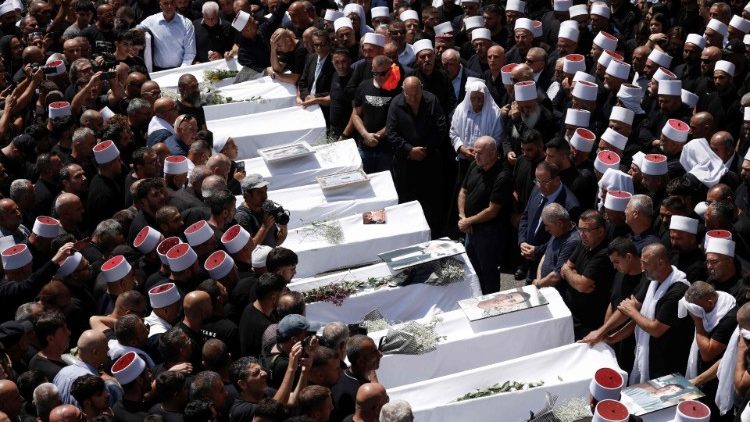In a dramatic escalation of violence, a rocket strike hit a football field in the Golan Heights in Israel on Saturday evening. This tragic attack killed 12 children and teenagers, shocking Israel and raising fears of a larger conflict. The university near the area, the University of Haifa, has responded by asking staff above the fifth floor to work from home due to safety concerns.
Growing Hostilities
The rocket attack is part of a larger pattern of escalating violence. Since October 8, Hezbollah has fired rockets and shells at Israeli targets. This comes after Hamas’s attack on Israel a day earlier. Both groups seek the destruction of the Israeli state, leading to frequent and deadly exchanges.
Death Toll and Response
The recent hostilities have resulted in significant casualties on both sides. Over 450 people in Lebanon have died, including about 100 civilians. In Israel, 23 civilians and 17 soldiers have been killed. The attacks have been severe, but both sides seem to be avoiding a full-scale war.
Reaction from Israel
The deadly strike on the Golan Heights is the most significant loss of life in the recent conflict. Thousands gathered in Majdal Shams, the Druze town hit by the rocket, to mourn the young victims. The Israeli government has accused Hezbollah of carrying out the attack, though Hezbollah denies involvement.
In response, Israeli Prime Minister Benjamin Netanyahu has returned from a trip to the US. He is now leading security discussions and has promised a strong retaliation against Hezbollah. The Israeli security cabinet has authorised him and the defense minister to decide on the timing and manner of the response.
International Concerns
The international community is closely watching the situation. Western governments, including the US, are urging restraint from both sides. The White House is working on a diplomatic solution to end the violence and prevent further attacks along the Israel-Lebanon border.
Impact on Daily Life
The conflict has had a profound effect on daily life. In Majdal Shams, the funerals of the young victims were marked by deep sorrow. The Druze community, which has lived on the Golan Heights for centuries, is particularly affected. Many are expressing outrage and grief over the loss.
In response to the rising tensions, several airlines, including Air France, Lufthansa, Swiss International Air Lines, and Eurowings, have suspended flights to and from Beirut. This reflects growing fears of further violence and instability.
Hezbollah’s Role and Iran’s Influence
Hezbollah, a powerful non-state actor in the region, is heavily armed with an estimated 150,000 rockets and missiles. The group is also a key proxy of Iran in the Middle East. An attack on Hezbollah could potentially draw in Tehran, which has warned Israel of severe consequences if it escalates further into Lebanon.
Israeli Political Dynamics
The situation is also influenced by internal Israeli Politics. Prime Minister Netanyahu’s popularity is waning, and he is under pressure to respond strongly to the attacks. Some critics believe he might be prolonging the conflict with Hamas in Gaza to avoid facing an early election, which could end his career. This internal pressure might lead him to escalate the conflict with Hezbollah to bolster his political standing.
Looking Ahead
The current situation is extremely volatile. While both sides have managed to avoid a full-scale war so far, the deadly rocket attack on the Golan Heights could change that. The international community continues to call for restraint, but the risk of a wider conflict remains high.
In summary, the recent escalation in violence between Israel and Hezbollah has brought significant challenges and fears. The situation is fluid, and how both sides respond will be crucial in determining whether the conflict will expand or de-escalate. The international community’s role in mediating and finding a resolution will be vital in preventing further loss of life and instability in the region.

